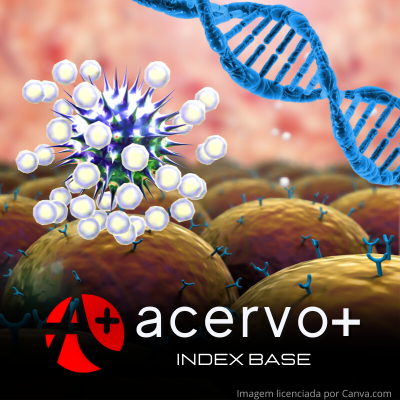Investigação de variantes genéticas associadas a parâmetros bioquímicos da obesidade: uma revisão sistemática
##plugins.themes.bootstrap3.article.main##
Resumo
Objetivo: Investigar na literatura as variantes genéticas relacionadas com parâmetros bioquímicos da obesidade. Métodos: Trata-se de uma revisão sistemática nas bases de dados Pubmed e Scielo, seguindo as recomendações do Preferred Reporting Items for Systematic Reviews and Meta-Analyses (PRISMA). A busca foi realizada seguindo os critérios de seleção. Foram selecionados artigos originais que abordaram os parâmetros bioquímicos da obesidade e sua possível relação com as variantes nos genes ADRB3, ABCA1 e NPC1. Os artigos publicados em português, inglês ou espanhol nos últimos 10 anos foram incluídos nesta revisão. Os artigos de revisão da literatura, dissertações, capítulos de livros, editoriais e duplicatas foram excluídos da revisão. O gerenciamento dos artigos foi realizado na plataforma Mendeley a fim de evitar erros. Resultados: Infere-se que, os SNPs rs4994, rs9282541 e rs1805082 dos genes ADRB3, ABCA1 e NPC1, respectivamente, estão associados com parâmetros bioquímicos da obesidade, entretanto, disparidades étnicas puderam ser identificadas relacionadas a diferentes componentes bioquímicos do sangue e diferentes grupos populacionais, associados à idade, sexo e diferentes classificações do Índice de Massa Corporal (IMC). Considerações finais: Torna-se importante a elucidação da associação dos SNP identificados com diferentes grupos étnicos, promovendo o avanço no conhecimento científico sobre a obesidade.
##plugins.themes.bootstrap3.article.details##
Copyright © | Todos os direitos reservados.
A revista detém os direitos autorais exclusivos de publicação deste artigo nos termos da lei 9610/98.
Reprodução parcial
É livre o uso de partes do texto, figuras e questionário do artigo, sendo obrigatória a citação dos autores e revista.
Reprodução total
É expressamente proibida, devendo ser autorizada pela revista.
Referências
2. ARADILLAS-GARCÍA C, et al. Obesity is associated with the Arg389Gly ADRB1 but not with the Trp64Arg ADRB3 polymorphism in children from San Luis Potosí and León, México. Journal of Biomedical Research. 2017; 31(1): 40-46.
3. BARBOZA-CERDA M, et al. Phenotypic severity in a family with MEND syndrome is directly associated with the accumulation of potentially functional variants of cholesterol homeostasis genes. Molecular Genetics and Genomic Medicine. 2019; 7(9): e931.
4. CHATHOTH S, et al. Association of Uncoupling Protein 1 (UCP1) gene polymorphism with obesity: A case-control study. BMC Medical Genetics. 2018; 19(1): 203.
5. CHIOREAN A, et al. Signatures of natural selection and ethnic-specific prevalence of NPC1 pathogenic mutations contributing to obesity and Niemann–Pick disease type C1. Scientific Reports. 2020; 10(1): 18787.
6. DAGHESTANI M, et al. ADRB3 polymorphism rs4994 (Trp64Arg) associates significantly with bodyweight elevation and dyslipidaemias in Saudis but not rs1801253 (Arg389Gly) polymorphism in ARDB1. Lipids in Health and Disease. 2018; 17(1): 58.
7. DE LUIS DA, et al. Genetic variation in the beta-3-adrenoreceptor gene (Trp64arg polymorphism) and their influence on anthropometric parameters and insulin resistance after a high protein/low carbohydrate versus a standard hypocaloric diet. Nutrition hospitalaria. 2015; 32(2): 487-493.
8. DINIZ IG, et al. Common BMI and diabetes-related genetic variants: A pilot study among indigenous people in the Brazilian Amazon. Genetics and Molecular Biology. 2022; 45(2): e20210153.
9. FATIMA T, et al. Association analysis of the beta-3 adrenergic receptor Trp64Arg (rs4994) polymorphism with urate and gout. Rheumatology International. 2016; 36(2): 255-261.
10. FLORES-VIVEROS KL, et al. Contribution of genetic, biochemical and environmental factors on insulin resistance and obesity in Mexican young adults. Obesity Research and Clinical Practice. 2019; 13(6): 533-540.
11. GARVER WS. Gene-Diet Interactions in Childhood Obesity. Current Genomics. 2012; 12(3): 180–189.
12. GENIS-MENDOZA AD, et al. Interaction of FTO rs9939609 and the native American-origin ABCA1 p. Arg230Cys with circulating leptin levels in Mexican adolescents diagnosed with eating disorders: Preliminary results. Psychiatry Research. 2020; 291: 113270.
13. PESQUISA NACIONAL DE SAÚDE - PNS. 2019. In: Instituto Brasileiro de Geografia e Estatística (IBGE). Disponível em: https://www.ibge.gov.br/estatisticas/sociais/saude/9160-pesquisa-nacional-de-saude.html?=&t=o-que-e. Acessado em: 9 de setembro de 2022.
14. JAUCH-CHARA K e OLTMANNS KM. Obesity - A neuropsychological disease? Systematic review and neuropsychological model. Progress in Neurobiology. 2014; 114: 84–101.
15. MIRANDA-LORA AL, et al. Associations of common variants in the SLC16A11, TCF7L2, and ABCA1 genes with pediatric-onset type 2 diabetes and related glycemic traits in families: A case-control and case-parent trio study. Pediatric Diabetes. 2017; 18(8): 824-831.
16. RS1805082. In: National Library of Medicine (NIH). 2022. Disponível em: https://www.ncbi.nlm.nih.gov/snp/rs1805082. Acesso em: 12 de outubro de 2022.
17. PAZ CP, et al. Obesidade: considerações sobre os fatores genéticos Revista interdisciplinar ciências e saúde. Revista Interdisciplinar Ciências em Saúde. 2017; 4(2): 106-112.
18. PIGEYRE M, et al. Recent progress in genetics, epigenetics and metagenomics unveils the pathophysiology of human obesity. Clin Sci (Lond). 2016; 130(12): 943-86.
19. SAKAMOTO Y, et al. Beta-3-adrenergic Receptor rs4994 Polymorphism Is a Potential Biomarker for the Development of Nonalcoholic Fatty Liver Disease in Overweight/Obese Individuals. Disease Markers. 2019; 2019: 4065327.
20. SNUSTAD P, SIMMONS MJ. Fundamentos de genética. Rio de Janeiro: Guanabara Koogan. 2018; 7: 391-392p.
21. VELAZQUEZ-ROMAN J, et al. Association of FTO, ABCA1, ADRB3, and PPARG variants with obesity, type 2 diabetes, and metabolic syndrome in a Northwest Mexican adult population. Journal of Diabetes and its Complications. 2021; 35(11): 108025.
22. WANDERLEY EN e FERREIRA VA. Obesidade: uma perspectiva plural. Ciência & Saúde Coletiva. 2010; 15(1): 185-194.
23. WHEELER S e SILLENCE DJ. Niemann–Pick type C disease: cellular pathology and pharmacotherapy. Journal of Neurochemistry. 2020; 153(6): 674–692.
24. BMI CLASSIFICATION. In: World Health Organization (WHO). 2022. Disponível em: https://www.who.int/data/gho/data/themes/topics/topic-details/GHO/body-mass-index. Acesso em: 18 de novembro de 2022.
25. WORLD HEALTH ORGANIZATION (WHO). Obesity: preventing and managing the global epidemic: report of a WHO consultation. WHO Consultation on Obesity. 2000; 894: 252.
26. ZAHARAN NL, et al. Non-synonymous single-nucleotide polymorphisms and physical activity interactions on adiposity parameters in Malaysian adolescents. Frontiers in Endocrinology. 2018; 9: 209.

